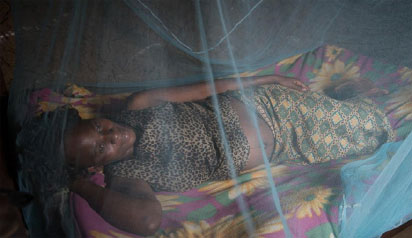MATERNAL malaria episode is a common occurrence in pregnancy and one of the concerns of pregnant women in Nigeria is just how best they can prevent or treat malaria.
According to guidelines provided by the World Health Organisation, WHO, a pregnant woman should obtain Intermittent Preventive Treatment of Malaria, IPTp, in the form of Sulphadoxine-Pyrimethamine (SP) to reduce maternal and foetal anaemia, prevent placental parasitaemia, low birth weight, and neonatal mortality.
All pregnant women are also expected to recieve iron and folic acid supplementation as a part of routine antenatal care. However, growing misconceptions about IPTp in pregnancy persist among women known to have attended antenatal care clinics, even as public health experts say the treatment therapy is safe for mothers and their unborn babies.
Intermittent preventive treatment with an antimalarial drug during pregnancy such as sulphadoxine-pyrimethamine (SP) is a cost-effective means of preventing malaria in pregnancy; unfortunately, the uptake has remained low as findings show that only a minority of pregnant women are receiving IPTp as recommended by national guidelines.
According to the 2015 Malaria Indicator Survey, MIS, only 19 per cent of pregnant women in Nigeria received three doses of IPTp. Studies identified wrong perceptions as number one reason why Nigeria could not meet the 80 percent target by the Nigeria government and the World Health organisation, WHO in 2015.
Respondents who attended ANC gave reasons ranging from personal risk, unavailability of the antenatal care service in their locality and the fear that medication from the health facilities could harm their unborn babies.
Others say they could not get the complete dosages due to late registration as large percentage of the respondents registered in the second trimester of pregnancy.
Findings by Good Health Weekly showed that the noncompliance with the new policy puts pregnant women at risk of malaria in pregnancy.
But public experts during a media chat organised by the National Media Elimination Programme, NMEP, in collaboration with Health Writers Association of Nigeria, HEWAN, in Lagos with the theme: “Malaria in Pregnancy” say IPTp has been linked to causing a decline in placental infection, anaemia, and low birth weight babies.
They maintained that using the strategy of Directly Observed Therapy, DOT, IPTp has no adverse effects on the safety of the pregnancy and will reduce number of malaria parasites in pregnant women, provide significant protection against anaemia & maternal mortality, reduced risk of miscarriage, stillbirth, pre-term delivery as well as lower the risk of low birth weight.
In the views of the Head of Advocacy, Communications and Social Mobilisation, National Malaria Elimination Programme, NMEP, Mrs. Itohowo Uko, with malaria accounting for 11 per cent of maternal deaths in pregnancy, there is need for women to adhere to the national guidelines which specify that at least every pregnant woman gets three doses.
Stating that most times malaria may be symptomless in pregnancy, Uko explained that malaria parasites can hide in the placenta and interfere with transfer of oxygen and nutrients to the baby, thereby increasing the risk of miscarriage, still birth, pre-term birth among others.
She said every pregnant woman should attend four scheduled visits to ANC, – 1st before 16 weeks, 2nd visit before 28 weeks, 3rd visit before 32 weeks and 4th visit before 40 weeks.
“These personalised visits provide the opportunity for a pregnant woman to be in contact with trained health care providers who can make regular malaria prevention and treatment interventions available to them.
“Even though there have been improvements in IPTp uptake from 2008 –2015, IPTp is still relatively low, if Nigeria wants to eliminate malaria and protect mothers and babies, there must be increase in uptake.”
Uko further stressed the need for women to sleep under LLINs, explaining that on the average, the insecticide is able to maintain its effect for about three years or following 20 washes. In her presentation, WHO Malaria Containment Programme Officer, Lagos, Dr. Tolu Arowolo, noted that malaria causes over 4,500 maternal deaths yearly in Nigeria.
For Arowolo, to stop these deaths and other complications caused by the parasites interference with transfer of oxygen and nutrients to the baby, every pregnant woman must initiate antenatal as soon as she is confirmed pregnant.
According to Arowolo, IPTp is based on the assumption that every pregnant woman living in an area of high malaria transmission has malaria in her blood stream or placenta, whether or not she has symptoms.
She noted that booking and administering of IPTp are critical in preventing malaria during pregnancy. Arowolo said that good nutrition was also critical during pregnancy as it helped to nourish the mother and foetus, as well as boost the immune system.
The National Coordinator, NMEP, Dr. Audu Mohammed, represented by the Head, Integrated Vector Management, NMEP, Dr. Joel Akilah, stressed the need for media practitioners to sensitise the populace especially, pregnant women, on the importance of early ANC attendance and uptake of IPTp to prevent malaria in Pregnancy.
The Malaria Technical Dr Bartholomew Odio, urged pregnant women to always request for testing before treatment because not all fever is malaria. The Head, Monitoring and Evaluation, NMEP, Mr Timothy Obot said despite commendable strategies deployed to prevent the disease huge gaps still remain in the campaign in terms of awareness creation.
However, health watchers are of the view that there is need for government to ensure effective ANC services where women can get information about pregnancy and how to cope throughout the period.
They say by allowing ANC clients to take their drugs at home as was found in some of the studies, compliance may not be guaranteed, thereby defeating the entire essence of IPTp.
Apart from risk detection, one of the objectives of antenatal care service is to provide pertinent health information and education to pregnant women that will help in addressing perceived myths and misconceptions about pregnancy-related issues, including malaria prevention.
In this instance, it presents a timely and unique opportunity to emphasize the inappropriateness and the inherent risks associated with the persistent use of chloroquine in malaria treatment and prevention in pregnancy.
Studies by WHO have revealed that ANC services provided in Africa and other developing countries like Nigeria are often substandard and have therefore significantly contributed to lower uptake of relevant preventive health interventions.




